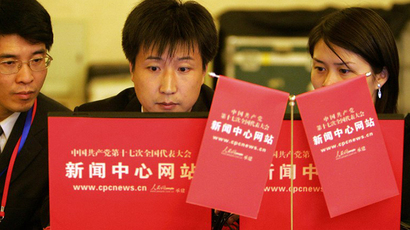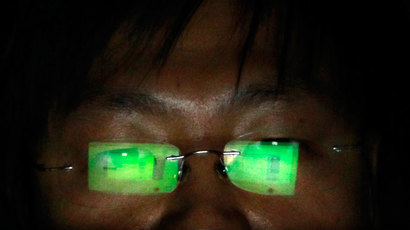China employs 2 million analysts to monitor web activity

Two million analysts are employed by China’s state and commercial clients to monitor people’s opinions posted on social networks, state media reported. Considered a means of feedback, some such analysts report to China’s leaders daily.
According to Beijing News, the job of those collecting and
reporting on views and attitudes of people on social networks has
recently been officially recognized as “internet opinion
analyst.”
Despite the seemingly overwhelming number of these experts, they
apparently remain in great demand in China, with open analyst
training courses taking place in mid-October.
The job role of one such internet opinion analyst, Tang Xiaotao,
was described by Beijing News.
Tang works with special “web crawling” software by
entering keywords set by the “customer.” He particularly
looks for any “negative public opinion” and reports any
such opinion to the decision-maker at the office.
He believes the institutions should not hide or ignore public
opinion, but should instead use it to actively identify and solve
the problems.
Tang said the analysts do not delete any posts, describing such
tactics as ineffective because the original message is often
replicated by sharing and caching.
The daily goes on to describe several cases of the effective
management of web-exposed scandals involving local politicians
and police by “calming down” the internet users’ opinion
with quick investigation, sacking the responsible public figures,
and using thorough online reporting.
However, it also gives a glimpse of Chinese government
involvement in such opinion analytics programs.
Tang, who works in an unspecified company, says he and his
counterparts receive some sort of a government list, sometimes
coming directly from the party leaders, asking to report on the
“division of public opinion” on certain issues.
Meanwhile, Yan Ming, director of the Network Information Center
of Henan province, detailed the types of reports he presents to
the “country’s leaders.”
Yan directly reports on public opinion to the government by means
of daily text messages and daily printed reports, as well as
larger weekly reports. Those can consist of more than 20 pages,
he revealed.
According to Shan Xuegang, deputy general secretary of the Online
Public Opinion Monitoring and Analysis Center operated by state
newswire Xinhua, the software used by Chinese analysts has become
very sophisticated, with thousands of processors filtering the
information from both local and foreign websites.
This is far cry from using Google, Baidu, and other search
engines previously used by Chinese web analysts, he added.














